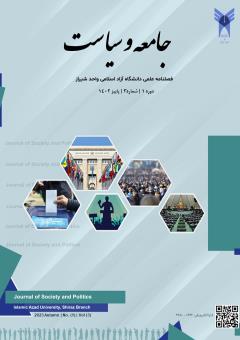واکاوی الگوهای سیاسی نفوذ نظام سلطه در جمهوری اسلامی ایران
محورهای موضوعی : جامعه شناسی سیاسی
1 - دانشجوی دکتری علوم سیاسی، واحد شهرضا، دانشگاه آزاد اسلامی ،شهرضا، ایران
کلید واژه: الگوهای سیاسی, نفوذ, نظام سلطه, جمهوری اسلامی ایران.,
چکیده مقاله :
چکیده الگوهای سیاسی نفوذ که حاصل تجربه استکبار جهانی در سرنگونی نظام های ضد امپریالیسم است، نقشه راه نفوذ سیاسی نظام سلطه در جمهوری اسلامی ایران است. لذا پژوهش حاضر در پاسخ به این پرسش که نفوذ سیاسی نظام سلطه با استفاده از چه الگوهای سیاسی در جمهوری اسلامی ایران صورت می گیرد ، به روش توصیفی ـ تحلیلی به واکاوی و تبیین الگوهای سیاسی نفوذ نظام سلطه در جمهوری اسلامی ایران پرداخته است . پژوهش حاضر نشان می دهد که نظام سلطه پس از ناکامی در رویکرد سخت برای مقابله با انقلاب اسلامی ایران با رویکرد نرم وارد کارزار مقابله با نظام جمهوری اسلامی شده است و با استفاده از الگوهای دموکراسی سازی، جنگ ایده ها، جنگ اراده ها، رفولوسیون، مبارزه بی خشونت، نرمالیزاسیون و نبرد محاسباتی، با هدف استحاله و سرنگونی انقلاب اسلامی، و با استفاده از بازیگران داخلی و خارجی، اقدام به نفوذ سیاسی در جمهوری اسلامی ایران نموده است.
Abstract The political patterns of influence which is the result of the experience of global arrogance in overthrowing anti-imperialist regimes are the roadmap for the political influence of the domination system in the Islamic Republic of Iran. Therefore this study is in response to this question that what political patterns are used for the political influence of the domination system in the Islamic Republic of Iran, in a descriptive-analytical method, has analyzed and explained the political patterns of influence of the domination system. The results of the present study show that system of domination, after failing in a hard approach to counter the Islamic Revolution of Iran, has entered the campaign against the system of the Islamic Republic with a soft approach. And system of domination using the patterns of democratization, war of ideas, war of wills, RefoLotion, nonviolent struggle, normalization and computational battle, with the aim of transmutation and overthrowing the Islamic Revolution, and using domestic and foreign influencers, has attempted to political influence in the Islamic Republic of Iran.
-Abdi, H. (2013), Soft war, Qom, Moaref publication.
-Abdollahkhani, A. (2006), American approaches and plans about Iran, Tehran, Abrar moaser publication.
-Achevaria, A. (2011) ,War of ideas, Tehran, Imam Sadegh University poblication
-Aghaei, S.D., Torabi, R. (2010),”Areflection on the forein policy of American human rights”,Faslnameh Siasat, No. 1, Spring.
-Akhavan, M. J. (2010), Passing the Tribulation: Rereading a year of soft battle, vol. 3, Tehran, Basij publication.
-Ameri, H. (1991), Principles of International Relations, Tehran, Agah publication.
-Aslani, F. and others (2017), “Consequences of the function of soft subvertion caused by enemy penetration”, Pasdary farhangi enghelab eslami, No. 15, Spring and Summer.
-Bagheri Chokami, S. (2016), The fourth of soft war, Qom, Zamzam Hedayat publication.
-Basiri, m. (2011), “Soft war against Islamic Republic of Iran”, Research of soft war Quarterly, No. 5, Spring.
-Beaufre, Andre (1987), Action Strategy, (Masoud Mohammadi Trans.), Tehran, Ministry of Foreign Affairs polication.
-Brinton, Crane (1987), Autopsy of four revolutions, Tehran, Now Poblication.
-Dashti, M. (2010), “Theoretical framework, it’s angles and requirement”, Islamic History in the Mirror of Research, No. 1, Spring.
-Dehghani Firouzabadi, S. j. (2011), “Power technologies in soft war”, Strategic Studies Quarterly, No. 51, Spring.
-Eftekhari, A. (2008), The Color Revolution: Designing an Analytical Framework, Tehran, Imam Sadegh University Poblication..
-Eftekhari, A. (2012), The pattern of psychological warfare of the West against Islamic Republic of Iran: a cultural approach, Tehran, Imam Sadegh University Poblication.
-Fars News (2015), “Farid Zakaria’s interview with John Sawers” (14/9/2015)
-Fazlinejad, P. (2009), “How the civil society project turned into a civil struggle. (Keyhan news. 13/7/2009).
-Fazlinejad, P. (2012), The secret Army of intellectuals, Tehran, Keyhan publication.
-Gerdab Site (2011), “The members of the American soft war organizing committee were identified”, (31/1/2011).
-Group Studies (2009), Soft threat in security of coping strategies, Tehran, Higher Defence University publication.
-Hajarian, S. (2015), “Normalization, a Prelude to Democratization”, Andisheh Pouya Monthly, No. 28, Summer.
-Hammond, John s. (2011). ”The Hidden Traps in Decision Making”, Harvard Business Review on Decision Making.
-Hazegh, h. (2015), “The origin and foundations of intellectual, cultural and political influence with an emphasis on American influence in Iran”, Psychological Operations Studies Quarterly, No. 42, Spring and Summer.
-Imam Khomeini (1999), Sahifeh Noor, Vol. 16, Tehran, Release of Imam Khomeini work publication.
-Iman, M. (2011), Paradigmatic Principles of Quantitative and Qualitative Research Methods in Human Sciences, Qom, Research institute of the Hozeh and University publication.
-Izadi, F. , Kardan, A. (2011), “Soft War, American Democracy and Evitism”, Rahbord Farhang, No. 16, Winter.
-Karami, A. (2016), Theorical conceptualization of influence, Tehran, Motaleat Rahbordi publication.
-Mansourian, Y. (2013), “The position of theorical and conceptual framework in research”, sokhan hafteh (4/11/2013).
-Mohammadi sirat, H., Mousavi nia, S. M. (2016), The influence of the arrogance front, Tehran, Imam Hosein University publication.
-Mohammadi, M. (2008), “Clash of civilization or clash of domination system”, Islamic government quarterly, No. 2, summer.
-Mottaghi, i. (2009), “Management of soft war in the space of imbalance”, Basij studies quarterly, No. 43, summer.
-Namdar, M. (2009), “Green hypocrisy, velvet glove theory and iron hand”, 15 Khordad quarterly, No. 20, summer.
-Nasr, S. (2001), Psychological operation, (M. Haghighat Kashani Trans.), Tehran, Soroush publication.
-Rezaei, M. (2017), “Understanding the American Penetration Against Iran’s Political Elite”, Proceeding of the 11th National Congress of Pioneers of Progress.
-Safavi, M. A. (2015), “Foreign Policy, computational and perceptual battle scene”, (Borhan Site 12/4/2015).
-Sharifi, A. (2010), Soft war, Qom, Imam Khomeini Educational Institute Poblication
-Sharp, G., Helvi, R. (2007), Civil Society, Sivil Struggle, (Mehdi Kalantarzadeh Trans.), Illaminators and women’s studies publication.
-Shiroudi, M. (2004), “Islamic Revolution and Thermidorian-Brinton theory”. Ravagh Andishe Quarterly, No. 39, Winter.


